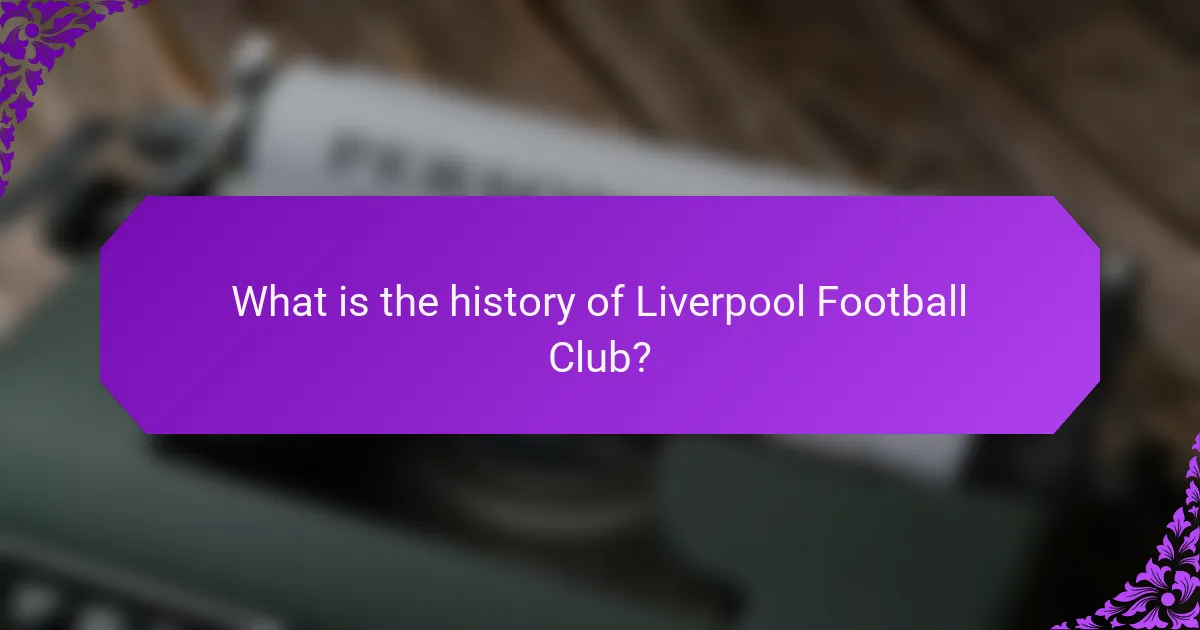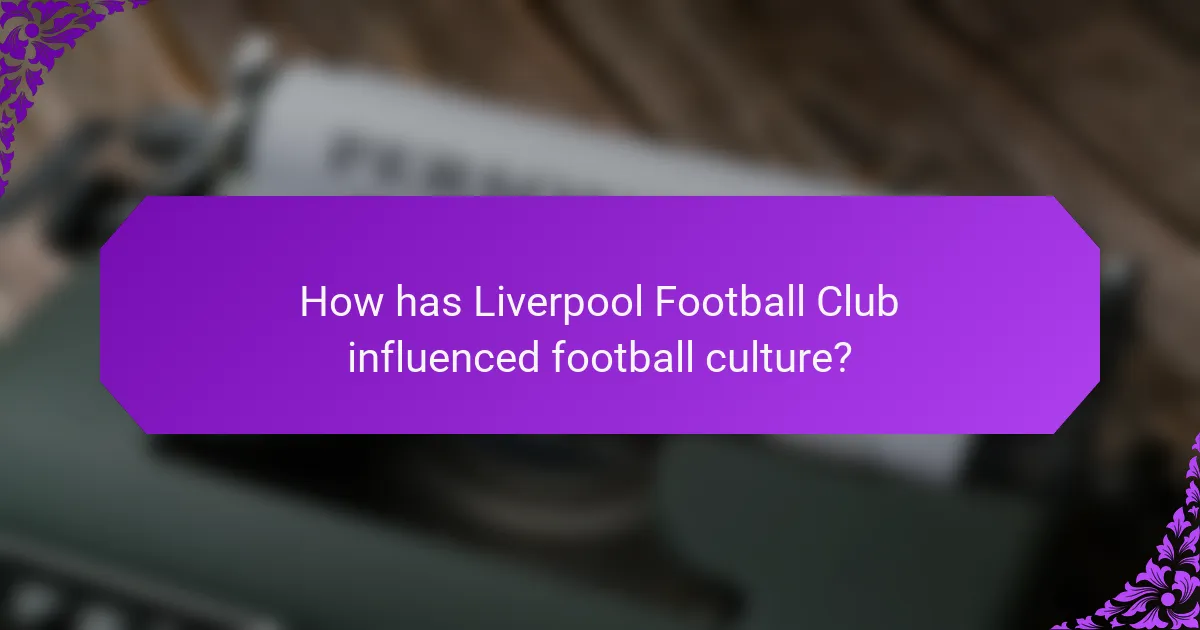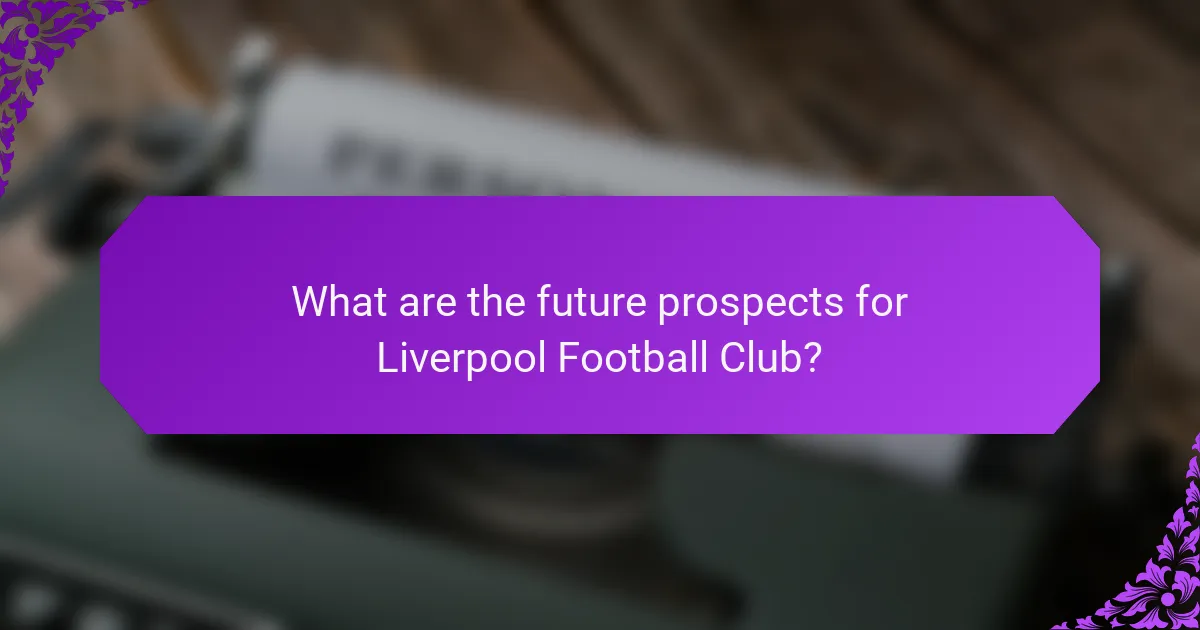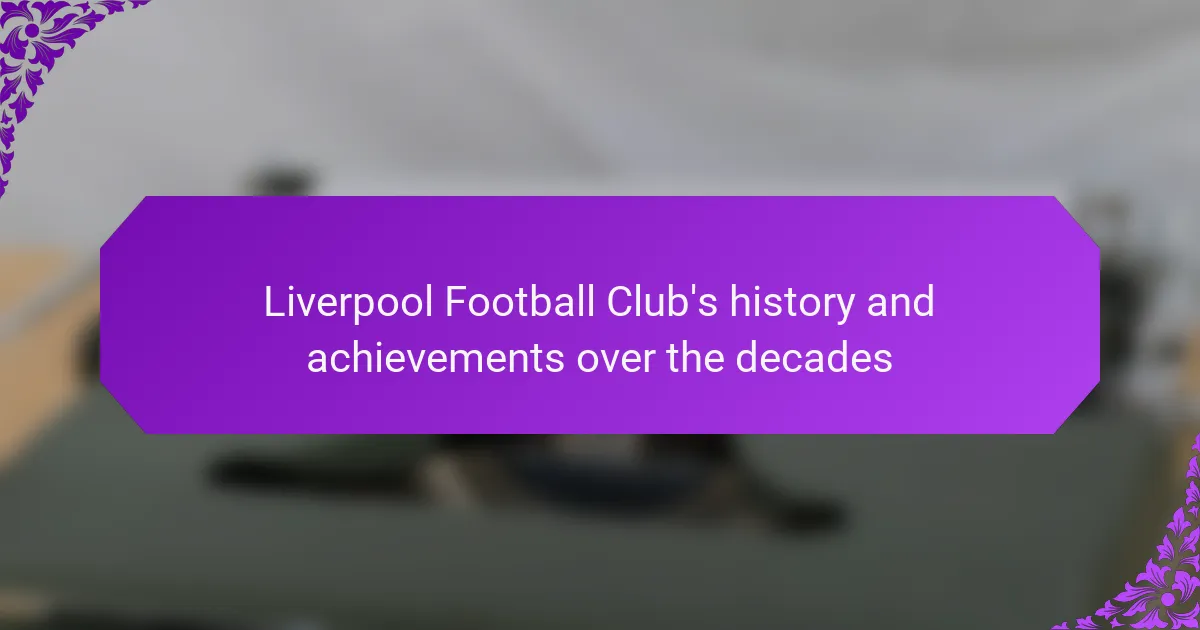Liverpool Football Club, established in 1892, has a storied history marked by significant achievements in both domestic and European football. The club has won 19 league titles and six UEFA Champions League titles, with their most recent European success occurring in 2019. Anfield, their iconic stadium, serves as the backdrop for a passionate fanbase known for its loyalty and vibrant matchday atmosphere, highlighted by the anthem “You’ll Never Walk Alone.” Liverpool’s influence extends beyond the pitch, with a commitment to community initiatives and a global outreach that reflects its status in football culture. The club’s future looks promising, supported by strong financial backing and ongoing investments in player development and infrastructure.

What is the history of Liverpool Football Club?
Liverpool Football Club was founded in 1892. The club was established after a dispute between Everton FC and Anfield’s owner. Liverpool quickly rose to prominence in English football. They won their first league title in 1901. The club has a rich history of success in domestic and European competitions. Liverpool has won a total of 19 league titles. They have also secured six UEFA Champions League titles, the most recent in 2019. The club’s iconic stadium, Anfield, has been their home since inception. Liverpool is known for its passionate fanbase and historic rivalries, particularly with Manchester United and Everton.
How did Liverpool Football Club begin its journey?
Liverpool Football Club began its journey in 1892. It was formed after a split from Everton Football Club. The initial matches were played at Anfield, which was originally Everton’s home ground. Liverpool quickly established itself in the local football scene. In 1893, the club joined the Football League. By 1901, Liverpool won its first league title. This early success laid the foundation for the club’s future achievements. The club’s history has since been marked by numerous trophies and a dedicated fanbase.
What were the key events in the founding of Liverpool Football Club?
Liverpool Football Club was founded in 1892. The club emerged after a dispute between Everton FC and Anfield’s owners. Everton left Anfield, prompting John Houlding to create a new club. Houlding named the new club Liverpool FC. The club initially joined the Lancashire League. Liverpool FC then became a member of the Football League in 1893. The club won its first league title in 1901. These events established Liverpool FC as a significant entity in football history.
Who were the initial players and management involved in the early years?
The initial players of Liverpool Football Club included John McKenna, who was a key figure in the club’s founding. The first team captain was John McDougall, a prominent player during the early years. Management was led by William E. McKenna, who served as the first secretary. The club was established in 1892 and quickly gained recognition. In its inaugural season, Liverpool finished as runners-up in the Second Division. The early squad featured players like Sam Raybould and Jack Cox, who contributed to the team’s development. Liverpool’s early management and players laid the foundation for future successes.
What significant milestones has Liverpool Football Club achieved over the decades?
Liverpool Football Club has achieved numerous significant milestones over the decades. The club was founded in 1892 and quickly established itself as a major force in English football. Liverpool won its first league title in 1901, marking the beginning of its dominance in the early 20th century. The club has won a total of 19 league titles, with its most recent victory in 2019.
In European competition, Liverpool has been highly successful, winning the UEFA Champions League six times, with notable victories in 1977, 1984, and 2005. The 2005 final is particularly famous for the club’s comeback from a 3-0 deficit against AC Milan. Liverpool also won the UEFA Cup three times, further cementing its reputation in European football.
The club’s iconic stadium, Anfield, has been home to many memorable moments, including record attendance figures. Liverpool’s passionate fan base and famous anthem, “You’ll Never Walk Alone,” have contributed to its rich history. The club’s achievements have made it one of the most successful and storied teams in football history.
Which major trophies has Liverpool Football Club won?
Liverpool Football Club has won numerous major trophies. The club has secured 19 league titles in England. They have also won 6 UEFA Champions League titles. Liverpool has claimed 3 UEFA Super Cups. Additionally, they have won 7 FA Cups. The club has also lifted 8 EFL Cups. These achievements highlight Liverpool’s success in both domestic and international competitions.
How have Liverpool’s achievements evolved through different eras?
Liverpool Football Club’s achievements have evolved significantly through different eras. In the early 1900s, Liverpool won its first league title in 1901. The club established itself as a dominant force by winning five league titles by 1922. The post-war period saw Liverpool achieve further success, including winning the FA Cup in 1965 and the European Cup in 1977. The 1980s marked a golden era, with Liverpool winning multiple league titles and European Cups, totaling 11 league titles by 1990.
In the 2000s, Liverpool experienced a resurgence, highlighted by their historic Champions League victory in 2005. The club won its 18th league title in 2020, marking its first top-flight title in 30 years. Overall, Liverpool’s achievements reflect a rich history of domestic and European success, characterized by periods of dominance and resurgence.
What notable figures have shaped Liverpool Football Club’s legacy?
Bill Shankly, Bob Paisley, and Kenny Dalglish are notable figures who shaped Liverpool Football Club’s legacy. Bill Shankly, as manager from 1959 to 1974, transformed the club’s culture and success. He led Liverpool to three league titles and the FA Cup. Bob Paisley succeeded Shankly and managed the club from 1974 to 1983. Under his leadership, Liverpool won six league titles and three European Cups. Kenny Dalglish, both player and manager, contributed significantly to the club’s identity. He won numerous trophies, including the league title and FA Cup as a player and manager. These figures collectively established Liverpool’s status as a dominant force in football. Their contributions are celebrated in the club’s rich history.
Who are the most influential managers in Liverpool’s history?
Bill Shankly, Bob Paisley, and Kenny Dalglish are the most influential managers in Liverpool’s history. Bill Shankly transformed the club in the 1960s. He led Liverpool to three league titles and their first FA Cup. Bob Paisley succeeded Shankly and won six league titles and three European Cups. His tactical innovations set new standards. Kenny Dalglish played a dual role as player and manager. He won multiple league titles and an FA Cup in the late 1980s and early 1990s. Each manager significantly shaped Liverpool’s identity and success. Their legacies continue to influence the club today.
Which players have made the most significant impact on the club?
Liverpool Football Club has been significantly impacted by several key players. Steven Gerrard is often regarded as the most influential figure in the club’s history. He made 710 appearances and scored 185 goals. Gerrard captained Liverpool to numerous victories, including the memorable 2005 UEFA Champions League final. Kenny Dalglish is another pivotal figure, contributing as both a player and manager. He scored 172 goals during his playing career and led Liverpool to multiple league titles. Ian Rush also stands out, being the club’s all-time leading scorer with 346 goals. His contributions helped secure numerous domestic and European trophies. These players have left an indelible mark on Liverpool’s legacy.

How has Liverpool Football Club influenced football culture?
Liverpool Football Club has significantly influenced football culture through its passionate fanbase and iconic anthems. The club’s supporters are known for their unwavering loyalty and vibrant atmosphere at matches. Anfield, their home ground, is famous for its electrifying environment, especially during key matches. The anthem “You’ll Never Walk Alone” unites fans and has become synonymous with the club.
Liverpool’s success in domestic and European competitions has set high standards in football. They have won 19 league titles and six European Cups, showcasing a tradition of excellence. The club’s attacking style of play has also shaped football tactics over the years.
Additionally, Liverpool’s commitment to community initiatives has influenced how clubs engage with local fans. Their global outreach has made them a symbol of football culture worldwide. The club’s history and achievements continue to inspire future generations of players and fans alike.
What role has Liverpool Football Club played in the development of football in England?
Liverpool Football Club has significantly influenced the development of football in England. Founded in 1892, the club quickly became a powerhouse in English football. Liverpool has won 19 league titles, establishing a strong competitive legacy. The club’s success in the 1970s and 1980s, including four European Cups, elevated the profile of English football globally. Liverpool’s iconic Anfield stadium has been a venue for historic matches, contributing to the sport’s cultural significance. The club’s youth academy has produced numerous talented players, fostering local talent. Liverpool’s passionate fan base has also played a role in promoting football culture in England. The club’s commitment to community initiatives has further strengthened its impact on the sport.
How has Liverpool’s fan culture contributed to its identity?
Liverpool’s fan culture has significantly shaped its identity through passionate support and community involvement. The club’s anthem, “You’ll Never Walk Alone,” embodies unity and resilience among fans. This strong sense of belonging fosters a deep emotional connection to the team. Liverpool supporters are known for their unwavering loyalty, often filling Anfield with a sea of red. The atmosphere created during matches enhances the home advantage for the team. Historical events, such as the Hillsborough disaster, have further strengthened the bond among fans, leading to collective activism for justice. The fan culture is integral to Liverpool’s reputation as a club with rich traditions and values.
What are the historical rivalries that define Liverpool’s competitive spirit?
Liverpool’s competitive spirit is defined by historical rivalries with Manchester United, Everton, and Chelsea. The rivalry with Manchester United is rooted in the fierce competition for titles and regional pride. Matches between these two clubs are among the most anticipated in English football. The Merseyside derby against Everton is notable for its local significance and passionate fan engagement. This rivalry dates back to 1892, marking over a century of competitive encounters. Additionally, the rivalry with Chelsea intensified in the 2000s, particularly during key matches in the Premier League and Champions League. These rivalries have shaped Liverpool’s identity and competitive ethos throughout its history.
How has Liverpool Football Club adapted to changes in the football landscape?
Liverpool Football Club has adapted to changes in the football landscape through strategic investment and innovation. The club has embraced advanced analytics and sports science to enhance player performance. This includes employing data analysts to inform recruitment and training methods. Liverpool has also invested in youth development, establishing the Academy to nurture young talents. The club’s successful transfer strategy, highlighted by the acquisition of players like Mohamed Salah, reflects its adaptability in a competitive market. Furthermore, Liverpool has modernized its facilities, including the renovation of Anfield, to improve fan experience and revenue generation. These initiatives have contributed to their recent successes, including winning the UEFA Champions League in 2019 and the Premier League in 2020.
What changes in management and strategy have been made over the decades?
Liverpool Football Club has undergone significant changes in management and strategy over the decades. In the 1960s, Bill Shankly revolutionized the club with a focus on teamwork and a strong club culture. His emphasis on player fitness and tactical discipline led to the club’s first major successes, including the 1965 FA Cup.
In the 1970s and 1980s, Bob Paisley continued Shankly’s legacy, introducing a more analytical approach to player recruitment and training. This period saw Liverpool dominate English football, winning multiple league titles and European Cups.
The 1990s brought challenges, leading to the appointment of Gérard Houllier in 1998. Houllier implemented a modern coaching philosophy and improved the club’s youth development system.
In the 2000s, Rafael Benítez focused on tactical flexibility and European competition, leading the club to a famous Champions League victory in 2005.
The arrival of Fenway Sports Group in 2010 marked a shift towards a data-driven approach in management. They emphasized long-term planning, financial stability, and a commitment to the club’s traditions.
Under Jürgen Klopp, appointed in 2015, Liverpool adopted a high-pressing style and invested in player development. This strategy culminated in winning the Premier League in 2020, the club’s first in 30 years.
Overall, Liverpool’s management and strategy have evolved from a focus on individual talent to a comprehensive, data-informed approach that integrates club culture, player development, and tactical innovation.
How has the club embraced technology and analytics in modern football?
Liverpool Football Club has embraced technology and analytics to enhance performance and strategy. The club utilizes advanced data analytics to inform player recruitment and match preparation. They employ video analysis tools to review game footage and assess player performance. GPS tracking devices monitor player movements and fitness levels during training and matches. Liverpool also uses software to analyze opponent tactics and develop counter-strategies. The integration of sports science has improved player health and injury prevention. These efforts have contributed to the club’s recent successes, including their 2019 UEFA Champions League victory. The combination of technology and analytics has positioned Liverpool as a leader in modern football.

What are the future prospects for Liverpool Football Club?
Liverpool Football Club’s future prospects appear positive. The club has a strong financial backing and a dedicated fan base. Recent investments in player development and infrastructure support long-term growth. Liverpool’s performance in domestic and European competitions remains competitive. The club’s management emphasizes sustainable success. Historical achievements, including six UEFA Champions League titles, enhance its global brand. Continued success on the field will likely attract top talent. Overall, Liverpool is well-positioned for future success in football.
How is Liverpool Football Club preparing for upcoming challenges?
Liverpool Football Club is preparing for upcoming challenges through strategic player acquisitions and intensive training regimens. The club has recently focused on strengthening its squad depth by signing key players in the transfer market. This includes addressing specific positions that require reinforcement based on past performance analysis.
Additionally, the coaching staff has implemented tailored training sessions to enhance player fitness and tactical awareness. Liverpool’s training facilities have been upgraded to support advanced performance analytics.
The club also emphasizes mental resilience by incorporating sports psychology into their preparation. This holistic approach aims to equip players to handle high-pressure situations effectively.
Recent seasons have shown that such preparations have led to improved results in both domestic and European competitions.
What are the club’s goals for the next decade?
Liverpool Football Club aims to enhance its global presence and competitiveness in the next decade. The club intends to invest in youth development and scouting. Liverpool seeks to maintain its position in top-tier football competitions. The club also aims to achieve sustainable financial growth. Increasing fan engagement and community involvement is a priority. Additionally, Liverpool plans to strengthen its squad through strategic signings. The club aspires to win more domestic and international titles. These goals align with its historical commitment to excellence in football.
How does Liverpool Football Club plan to maintain its competitive edge?
Liverpool Football Club plans to maintain its competitive edge through strategic investments in player development and analytics. The club prioritizes recruiting talented youth players and integrating them into the first team. This approach has been evident in their academy’s success, producing players like Trent Alexander-Arnold. Additionally, Liverpool employs advanced data analytics to enhance performance and inform tactical decisions. The use of sports science and technology aids in injury prevention and player fitness. Furthermore, strong leadership from the management team ensures a clear vision and direction for the club. This combination of youth development, analytics, and leadership supports Liverpool’s ambition to remain competitive in both domestic and European competitions.
What can fans expect from Liverpool Football Club moving forward?
Fans can expect Liverpool Football Club to continue its pursuit of domestic and international success. The club has a strong history of competing for titles, including the Premier League and UEFA Champions League. Recent seasons have shown a commitment to strengthening the squad through strategic signings. The club’s youth academy is producing talented players, ensuring a bright future. Liverpool’s management emphasizes a competitive playing style and tactical evolution. Additionally, the club’s global fanbase supports significant financial investment in facilities and player development. Overall, Liverpool aims to maintain its status as a top contender in football.
What initiatives are being introduced to enhance the fan experience?
Liverpool Football Club is introducing several initiatives to enhance the fan experience. These initiatives include improved matchday facilities and upgraded stadium technology. The club is implementing a new mobile app for real-time updates and fan engagement. Enhanced food and beverage options are being introduced at Anfield. Additionally, the club is increasing community outreach programs to connect with local fans. These efforts aim to create a more inclusive and enjoyable environment for supporters. Recent surveys indicate that fan satisfaction is a priority for the club’s management.
How can supporters engage with the club in new ways?
Supporters can engage with Liverpool Football Club in new ways through digital platforms and community initiatives. The club offers virtual events, allowing fans to participate in Q&A sessions with players and coaches. Additionally, supporters can join online forums to discuss club strategies and share experiences. The club’s social media channels provide real-time updates and interactive content. Fans can also participate in local charity events organized by the club, fostering community connections. Furthermore, the introduction of a mobile app enhances fan engagement with features like match-day notifications and exclusive content. These initiatives reflect a modern approach to fan interaction, aligning with trends in digital engagement.
Liverpool Football Club, founded in 1892, has a rich history marked by significant achievements in both domestic and European competitions. The club has won a total of 19 league titles and six UEFA Champions League titles, with a passionate fanbase and iconic stadium, Anfield, contributing to its legacy. Key figures in the club’s history include influential managers like Bill Shankly and Bob Paisley, as well as legendary players such as Steven Gerrard and Kenny Dalglish. The article explores Liverpool’s historical milestones, rivalries, and the evolution of its management and strategies, as well as its future prospects and initiatives to enhance fan engagement.
